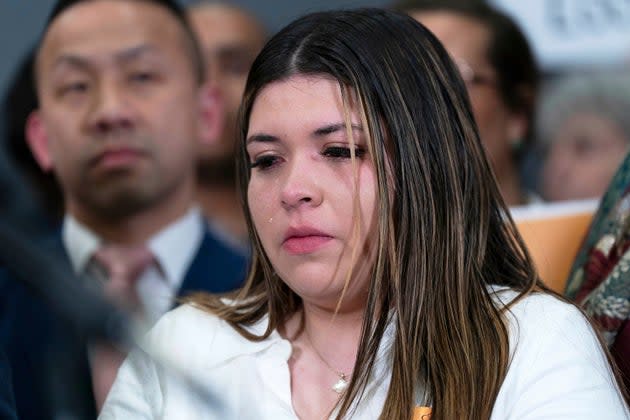The wife of Kilmar Abrego Garcia, a Salvadoran man wrongfully deported from the United States, has been forced to move to a safe house after the Department of Homeland Security (DHS) shared a court document with her address on social media. This incident occurred after DHS posted the document, which included the address, to its 2.4 million followers on X (formerly Twitter). The move prompted concerns for the safety of Jennifer Vasquez Sura, Abrego Garcia’s wife, and their three children.
In an interview with The Washington Post, Vasquez Sura described her fear after the government revealed her home address online. “I don’t feel safe when the government posts my address, the house where my family lives, for everyone to see, especially when this case has gone viral and people have all sorts of opinions,” she said. “So, this is definitely a bit terrifying. I’m scared for my kids.”
A statement from DHS to The Independent clarified that the document containing the address is a public record, accessible to anyone. However, Vasquez Sura’s safety concerns were heightened given the viral nature of the case and the potential for people to act on the shared information.
Deportation Controversy
Kilmar Abrego Garcia’s deportation to El Salvador on March 15, 2025, came after a series of court rulings criticized the Trump administration’s handling of his case. These rulings emphasized that the administration failed to ensure Garcia’s safe return from El Salvador despite a 2019 court order blocking his removal due to humanitarian reasons. Despite this, DHS publicly introduced unproven allegations of criminal activity against Garcia, including claims that he was a violent MS-13 gang member involved in human trafficking.
Garcia’s wife, Jennifer Vasquez Sura, has argued that her husband was denied due process by the administration, and that the accusations against him were not properly addressed in court. She expressed concern over the government’s portrayal of her husband, particularly the focus on a 2021 protective order she had filed after a domestic incident. Vasquez Sura had dissolved the order a month later, explaining that the incident was related to the stress of his immigration detention, financial hardship, and raising special needs children.
Family Struggles and Public Response
Vasquez Sura acknowledged that their relationship faced challenges, but she described the incident in 2021 as a result of overwhelming pressure. She emphasized that this should not justify the federal government’s actions in deporting her husband. “Look, Kilmar is not perfect — nobody is,” she told The Washington Post. “Every day, you grow. Every day, you learn. And he was trying his best for me, for our kids, for our future.”
The government’s actions and the subsequent social media post have sparked criticism, with many questioning the appropriateness of sharing such sensitive information. As the case continues to unfold, the family’s safety concerns remain a critical issue.
Legal and Ethical Concerns
This incident raises serious concerns about the ethics of posting personal information online by government agencies, especially in high-profile cases. Advocates for Abrego Garcia have condemned the actions of the DHS, arguing that they have further endangered the family’s safety and well-being. The case also underscores the challenges many immigrants face when navigating a legal system that often seems at odds with their rights and protection.
As the situation continues to develop, the pressure on the administration to address both the legal and ethical implications of their actions grows.












